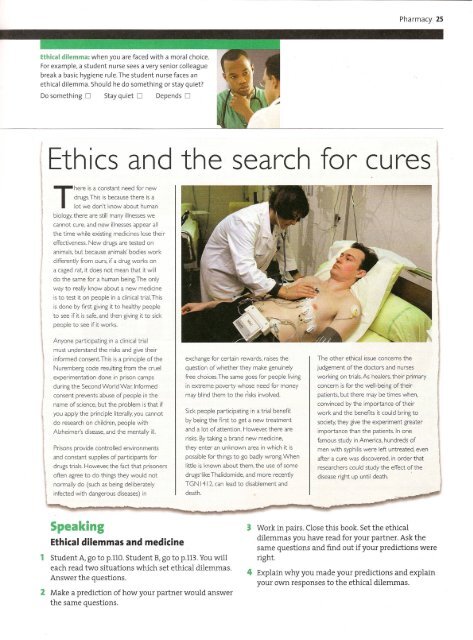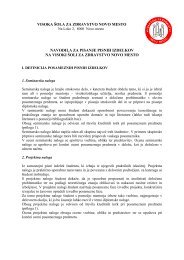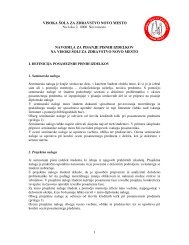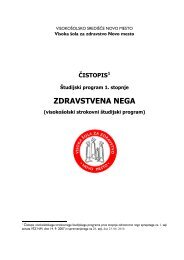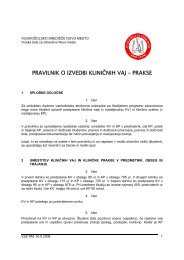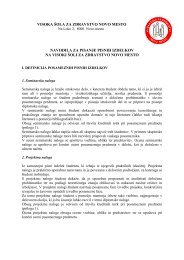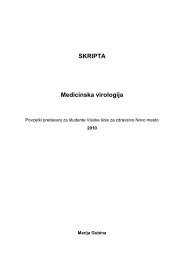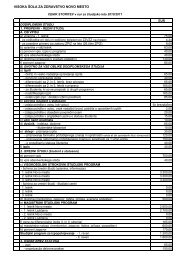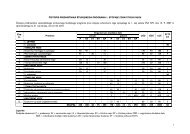Scrub up Vocabulary
Scrub up Vocabulary
Scrub up Vocabulary
- No tags were found...
Create successful ePaper yourself
Turn your PDF publications into a flip-book with our unique Google optimized e-Paper software.
Ethical dilemma: when you are faced with a moral choice.<br />
For example, a student nurse sees a very senior colleague<br />
break a basic hygiene rule. The student nurse faces an<br />
ethical dilemma. Should he do something or stay qUiet<br />
Do something 0 Stay quiet 0 Depends 0<br />
\Ethics and the search for<br />
cures I<br />
I<br />
III<br />
There is a constant need for new<br />
drugs.This is because there is a<br />
lot we don't know about human<br />
biology, there are still many illnesses we<br />
cannot cure, and new illnesses appear all<br />
the time while existing medicines lose their<br />
effectiveness. New drugs are tested on<br />
animals, but because animals' bodies work<br />
differently from ours, if a drug works on<br />
a caged rat, it does not mean that it will<br />
do the same for a human being.The only<br />
way to really know about a new medicine<br />
is to test it on people in a clinical trial.This<br />
is done by first giving it to healthy people<br />
to see if it is safe, and then giving it to sick<br />
people to see if it works.<br />
Anyone participating in a clinical trial<br />
must understand the risks and give their<br />
informed consent.This is a principle of the<br />
Nuremberg code resulting from the cruel<br />
experimentation done in prison camps<br />
during the Second World War Informed<br />
consent prevents abuse of people in the<br />
name of science, but the problem is that if<br />
you apply the principle literally,you cannot<br />
do research on children, people with<br />
Alzheimer's disease, and the mentally ill.<br />
Prisons provide controlled environments<br />
and constant s<strong>up</strong>plies of participants for<br />
drugs trials. However, the fact that prisoners<br />
often agree to do things they would not<br />
normally do (such as being deliberately<br />
infected with dangerous diseases) in<br />
exchange for certain rewards, raises the<br />
question of whether they make genuinely<br />
free choices. The same goes for people living<br />
in extreme poverty whose need for money<br />
may blind them to the risks involved.<br />
Sick people participating in a trial benefit<br />
by being the first to get a new treatment<br />
and a lot of attention. However, there are<br />
risks. By taking a brand new medicine,<br />
they enter an unknown area in which it is<br />
possible for things to go badly wrong. When<br />
little is known about them, the use of some<br />
drugS'like Thalidomide, and more recently<br />
TGN 1412, can lead to disablement and<br />
death.<br />
The other ethical issue concerns the<br />
judgement of the doctors and nurses<br />
working on trials. As healers, their primary<br />
concern is for the well-being of their<br />
patients, but there may be times when,<br />
convinced by the importance of their<br />
work and the benefits it could bring to<br />
society, they give the experiment greater<br />
importance than the patients. In one<br />
famous study in America, hundreds of<br />
men with syphilis were left untreated, even<br />
after a cure was discovered, in order that<br />
researchers could study the effect of the<br />
disease right <strong>up</strong> until death.<br />
Speaking<br />
Ethical dilemmas<br />
and medicine<br />
1 Student A, go to p.1lO. Student B,go to p.m. You will<br />
each read two situations which set ethical dilemmas.<br />
Answer the questions.<br />
2 Make a prediction of how your partner would answer<br />
the same questions.<br />
3 Work in pairs. Close this book. Set the ethical<br />
dilemmas you have read for your partner. Ask the<br />
same questions and find out if your predictions were<br />
right.<br />
4 Explain why you made your predictions and explain<br />
your own responses to the ethical dilemmas.


